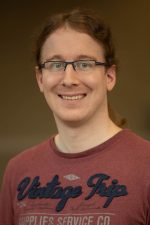MPI-SWS PhD students appointed as tenure-track faculty at ETH Zurich and ISTA
MPI-SWS PhD students Michalis Kokologiannakis and Michael Sammler have accepted tenure-track faculty positions at ETH Zurich and the Institute of Science and Technology Austria, respectively.
Michalis Kokologiannakis, a doctoral student in the Software Analysis and Verification group, has accepted a tenure-track faculty position at ETH Zurich. Michalis is broadly interested in programming languages, compilers, weak memory models, and software verification. More specifically, he is interested in developing novel algorithmic techniques for verifying concurrent software,
...MPI-SWS PhD students Michalis Kokologiannakis and Michael Sammler have accepted tenure-track faculty positions at ETH Zurich and the Institute of Science and Technology Austria, respectively.
Michalis Kokologiannakis, a doctoral student in the Software Analysis and Verification group, has accepted a tenure-track faculty position at ETH Zurich. Michalis is broadly interested in programming languages, compilers, weak memory models, and software verification. More specifically, he is interested in developing novel algorithmic techniques for verifying concurrent software, while also taking into account the weak memory models employed by modern microprocessors. You can find out more about his work at https://people.mpi-sws.org/~michalis/.
Michael Sammler, a doctoral student in the Foundations of Computer Security and Foundations of Programming groups, has accepted a tenure-track faculty position at the Institute of Science and Technology Austria (ISTA). Before starting at ISTA, he will spend one year as a postdoctoral fellow in the Programming Methodology Group at ETH Zurich. Michael's research interests lie in implementing efficient and practical systems and formally proving properties about them. In particular, his research focuses on building formal verification tools for low-level systems code that combine foundational proofs in a proof assistant with a high degree of automation. You can find out more about his work at https://people.mpi-sws.org/~msammler/ and https://ista.ac.at/en/research/sammler-group/.
Congratulations Michael and Michalis!


